Expansion pins are very frequently used fasteners. The use of expansion plugs not only ensures quick installation and stability of mounting, but also avoids disturbing the wall structure and destroying plasters. We tell you what to pay attention to when it comes to expansion plugs and how to choose the right expansion plug for plasterboard, polystyrene and concrete.
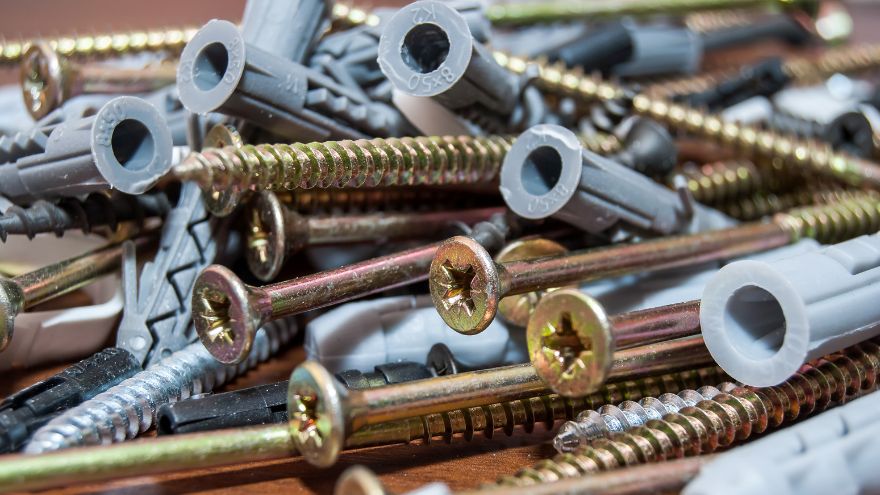
Check the expansion plugs at the Onninen wholesaler
What should you consider when choosing an expansion plug?
Expansion plugs are available in various variants. Some pins are made of plastic (e.g. polypropylene), others are made of metal. There are many pin lengths to choose from, generally from 28 mm to even 200 mm. The expansion plug must be matched to the specific application, in particular to:
- material and properties of the substrate,
- weight of fastened objects,
- diameter of the mounting hole.
Correct fit is the basis for reliability and long service life of the fastening. Most models available on the market are universal expansion plugs, which are a good choice for non-cracked concrete, aerated concrete, plasterboards, aerated concrete, hollow bricks or solid ceramic bricks.
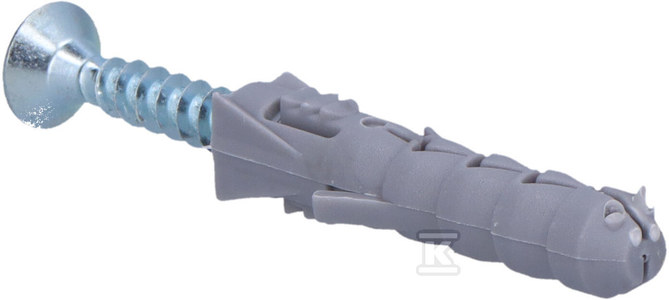 Universal pins generally have dedicated screws or bolts included in the set. These elements are different from each other, although they are often treated as synonyms by non-professionals. Therefore, when looking for universal pins with screws, you may encounter a situation where instead of typical screws there are screws, e.g. with a hexagonal head. If you decide on a set of universal expansion plug + screw, be sure to pay attention to the dimensions and material of the screw. Strength and corrosion resistance are guaranteed by galvanized steel.
Universal pins generally have dedicated screws or bolts included in the set. These elements are different from each other, although they are often treated as synonyms by non-professionals. Therefore, when looking for universal pins with screws, you may encounter a situation where instead of typical screws there are screws, e.g. with a hexagonal head. If you decide on a set of universal expansion plug + screw, be sure to pay attention to the dimensions and material of the screw. Strength and corrosion resistance are guaranteed by galvanized steel.
It is worth consulting the choice of the correct dowel with a specialist - especially in the case of lack of knowledge and experience in renovation and construction works and the intention to attach heavier elements. The installer will assess the possibilities of the substrate and select optimal installation solutions.
How to choose the right expansion plugs for plasterboard?
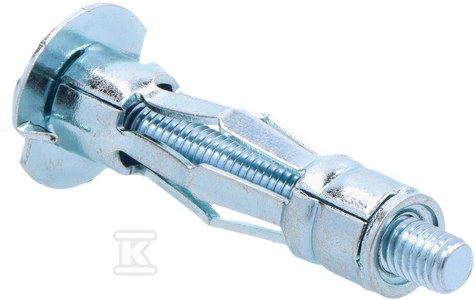 Plasterboards, commonly called plasterboards after the name of one of the key manufacturers (Rigips), appear very often in new construction. They are used to create partition walls, wall coverings, recess structures and suspended ceilings. The plaster dowel should be matched to the type and weight of the device or other object that you plan to attach to the board. There are standard expansion plugs with a straight screw, versions with a hook and special variants made of metal.
Plasterboards, commonly called plasterboards after the name of one of the key manufacturers (Rigips), appear very often in new construction. They are used to create partition walls, wall coverings, recess structures and suspended ceilings. The plaster dowel should be matched to the type and weight of the device or other object that you plan to attach to the board. There are standard expansion plugs with a straight screw, versions with a hook and special variants made of metal.
Relatively light elements, such as mirrors, shelves or wall lamps, can be successfully hung on plasterboard using a standard/universal dowel. Thanks to the collar on the edge, there is no chance that the pin will fall into the drilled hole. In the case of heavy loads, ranging from several dozen kilograms or more, you will need a special solution. Remember to carefully read the specification of a given product and check the thickness and strength of the substrate, e.g. walls kg.
Check the expansion plugs at the Onninen wholesaler
Which expansion plugs are suitable for Styrofoam?
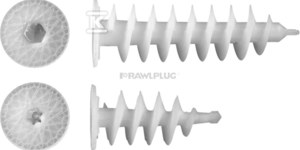 Styrofoam is used in construction mainly for thermal insulation. This is a very specific substrate, so you will need a special Styrofoam plug to ensure proper positioning of the boards and their tight adhesion to the facade. Special types of pins, the so-called Screw-in screws are used in mounting various types of light elements on insulated building facades. They allow you to mount an information board, a sign, external lighting or a camera. The pins should be 5 cm longer than the thickness of the insulation.
Styrofoam is used in construction mainly for thermal insulation. This is a very specific substrate, so you will need a special Styrofoam plug to ensure proper positioning of the boards and their tight adhesion to the facade. Special types of pins, the so-called Screw-in screws are used in mounting various types of light elements on insulated building facades. They allow you to mount an information board, a sign, external lighting or a camera. The pins should be 5 cm longer than the thickness of the insulation.
What material should concrete dowels be made of?
Both universal expansion pins and specialized metal anchors are used to stably fasten elements in concrete. The choice depends on the weight of the items you want to attach. If these are cabinets, shelves, mirrors, TV equipment or wall decorations, you can use a universal expansion plug - of course, after checking the maximum load in the product specification.
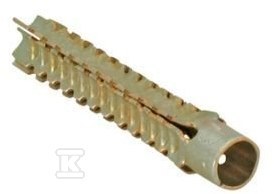 We offer universal pins made of high-quality polypropylene or nylon, intended for use in almost all building materials: concrete, thermal blocks, bricks, plasterboards, aerated concrete and others. The set with the dowel includes a screw with a conical head. You can easily choose the right drill. However, special steel concrete anchors are used to attach heavier objects. At the Onninen wholesaler you can buy a concrete pin (cellular concrete) made of electrolytically galvanized steel, the installation of which involves hammering in - it does not require drilling. Driven expansion plugs (another name are quick assembly plugs) are used for pass-through installation.
We offer universal pins made of high-quality polypropylene or nylon, intended for use in almost all building materials: concrete, thermal blocks, bricks, plasterboards, aerated concrete and others. The set with the dowel includes a screw with a conical head. You can easily choose the right drill. However, special steel concrete anchors are used to attach heavier objects. At the Onninen wholesaler you can buy a concrete pin (cellular concrete) made of electrolytically galvanized steel, the installation of which involves hammering in - it does not require drilling. Driven expansion plugs (another name are quick assembly plugs) are used for pass-through installation.
In what situation is a double-threaded screw useful?
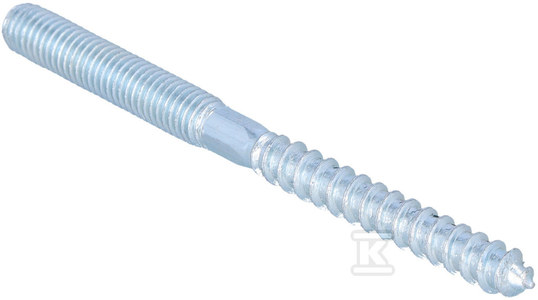 The set with the expansion plug (its so-called sleeve) may include a double-threaded screw . This is a unique type of screw, distinguished by its unique design. It ensures maximum precision, durability and reliability of mounting as well as easy disassembly of objects. It has two threads - external and internal, a head acting as a key and a pin. There may be a key holder between the threads.
The set with the expansion plug (its so-called sleeve) may include a double-threaded screw . This is a unique type of screw, distinguished by its unique design. It ensures maximum precision, durability and reliability of mounting as well as easy disassembly of objects. It has two threads - external and internal, a head acting as a key and a pin. There may be a key holder between the threads.
The double-threaded screw is widely used in construction, where it is used for mounting on walls and ceilings. It is also used in the machinery and automotive industries and in the production of sports equipment and electronics/home appliances. Double-threaded screws differ in length, metric thread size, screwing system, type of surface protection and material of manufacture.
Expansion plugs in the Onninen wholesaler
At the Onninen installation wholesaler , we know that solidly made and properly selected expansion plugs are the basis for safety, aesthetics and long-term durability of the fastenings. We offer both universal expansion plugs and special variants designed for heavy loads, unusual building materials and difficult environmental conditions. Our assortment includes expansion plugs for installation in plasterboard, aerated concrete, brick, Styrofoam or concrete, enabling the attachment of light and heavier objects, e.g. kitchen cabinets or sanitary equipment.